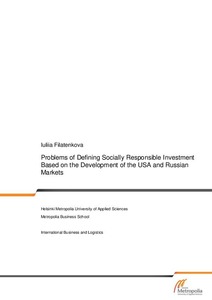Problems of Defining Socially Responsible Investment Based on the Development of the USA and Russian Markets
Filatenkova, Iuliia (2019)
Filatenkova, Iuliia
Metropolia Ammattikorkeakoulu
2019
All rights reserved
Julkaisun pysyvä osoite on
https://urn.fi/URN:NBN:fi:amk-201901181405
https://urn.fi/URN:NBN:fi:amk-201901181405
Tiivistelmä
The purpose of this work is to analyse approaches to the definition of socially responsible investment (SRI), to consider how the trend of SRI penetrates the securities market and affects the financial performance of investment portfolios.
Investors show increasing interest in socially responsible investments as an instrument to
achieve a sustainable development of society. Under SRI is meant consideration of ethical, social and environmental factors when making investment decisions. Despite that such an approach to investments started to spread widely relatively recently, individual and institutional investors already at the beginning of the 21st century started to realize that besides of accumulation of their finances, they can also create positive social changes and invest based on religious and ethical beliefs. However, the lack of an ultimate definition of criteria for determining a socially responsible investment creates difficulties in assessing the positive impact of investors’ activity.
Another problem arises when discussing fears concerning financial performances of SRI in comparison to conventional investments. Some researches show that limitation of selection criteria in ethical investments increases risks and can stop investors from inclusion of socially positive assets into their portfolios.
This thesis examines theoretical sources along with empirical findings, and questions whether it is possible to surely relate the portfolio to a socially responsible one and which elements determine the positive impact of following investments.
Investors show increasing interest in socially responsible investments as an instrument to
achieve a sustainable development of society. Under SRI is meant consideration of ethical, social and environmental factors when making investment decisions. Despite that such an approach to investments started to spread widely relatively recently, individual and institutional investors already at the beginning of the 21st century started to realize that besides of accumulation of their finances, they can also create positive social changes and invest based on religious and ethical beliefs. However, the lack of an ultimate definition of criteria for determining a socially responsible investment creates difficulties in assessing the positive impact of investors’ activity.
Another problem arises when discussing fears concerning financial performances of SRI in comparison to conventional investments. Some researches show that limitation of selection criteria in ethical investments increases risks and can stop investors from inclusion of socially positive assets into their portfolios.
This thesis examines theoretical sources along with empirical findings, and questions whether it is possible to surely relate the portfolio to a socially responsible one and which elements determine the positive impact of following investments.
